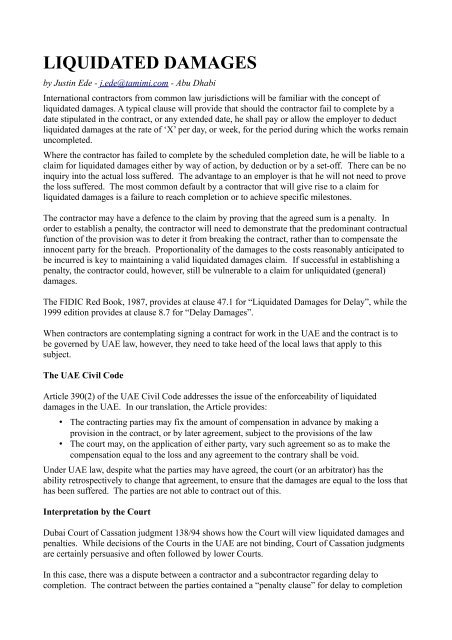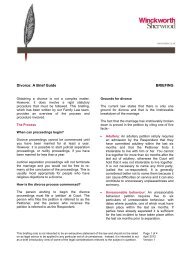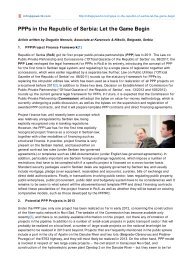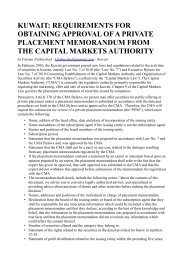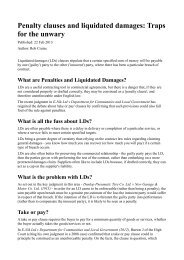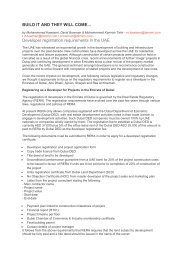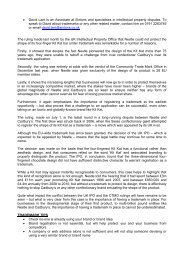LIQUIDATED DAMAGES - The Lawyer
LIQUIDATED DAMAGES - The Lawyer
LIQUIDATED DAMAGES - The Lawyer
Create successful ePaper yourself
Turn your PDF publications into a flip-book with our unique Google optimized e-Paper software.
<strong>LIQUIDATED</strong> <strong>DAMAGES</strong><br />
by Justin Ede - j.ede@tamimi.com - Abu Dhabi<br />
International contractors from common law jurisdictions will be familiar with the concept of<br />
liquidated damages. A typical clause will provide that should the contractor fail to complete by a<br />
date stipulated in the contract, or any extended date, he shall pay or allow the employer to deduct<br />
liquidated damages at the rate of ‘X’ per day, or week, for the period during which the works remain<br />
uncompleted.<br />
Where the contractor has failed to complete by the scheduled completion date, he will be liable to a<br />
claim for liquidated damages either by way of action, by deduction or by a set-off. <strong>The</strong>re can be no<br />
inquiry into the actual loss suffered. <strong>The</strong> advantage to an employer is that he will not need to prove<br />
the loss suffered. <strong>The</strong> most common default by a contractor that will give rise to a claim for<br />
liquidated damages is a failure to reach completion or to achieve specific milestones.<br />
<strong>The</strong> contractor may have a defence to the claim by proving that the agreed sum is a penalty. In<br />
order to establish a penalty, the contractor will need to demonstrate that the predominant contractual<br />
function of the provision was to deter it from breaking the contract, rather than to compensate the<br />
innocent party for the breach. Proportionality of the damages to the costs reasonably anticipated to<br />
be incurred is key to maintaining a valid liquidated damages claim. If successful in establishing a<br />
penalty, the contractor could, however, still be vulnerable to a claim for unliquidated (general)<br />
damages.<br />
<strong>The</strong> FIDIC Red Book, 1987, provides at clause 47.1 for “Liquidated Damages for Delay”, while the<br />
1999 edition provides at clause 8.7 for “Delay Damages”.<br />
When contractors are contemplating signing a contract for work in the UAE and the contract is to<br />
be governed by UAE law, however, they need to take heed of the local laws that apply to this<br />
subject.<br />
<strong>The</strong> UAE Civil Code<br />
Article 390(2) of the UAE Civil Code addresses the issue of the enforceability of liquidated<br />
damages in the UAE. In our translation, the Article provides:<br />
• <strong>The</strong> contracting parties may fix the amount of compensation in advance by making a<br />
provision in the contract, or by later agreement, subject to the provisions of the law<br />
• <strong>The</strong> court may, on the application of either party, vary such agreement so as to make the<br />
compensation equal to the loss and any agreement to the contrary shall be void.<br />
Under UAE law, despite what the parties may have agreed, the court (or an arbitrator) has the<br />
ability retrospectively to change that agreement, to ensure that the damages are equal to the loss that<br />
has been suffered. <strong>The</strong> parties are not able to contract out of this.<br />
Interpretation by the Court<br />
Dubai Court of Cassation judgment 138/94 shows how the Court will view liquidated damages and<br />
penalties. While decisions of the Courts in the UAE are not binding, Court of Cassation judgments<br />
are certainly persuasive and often followed by lower Courts.<br />
In this case, there was a dispute between a contractor and a subcontractor regarding delay to<br />
completion. <strong>The</strong> contract between the parties contained a “penalty clause” for delay to completion
and the Claimant sought to recover the penalty in full.<br />
<strong>The</strong> Court confirmed its general power to reduce the amount of damages agreed in the contract,<br />
where it is evident that the actual loss suffered is less than the total amount of damages agreed in<br />
the contract. A wide discretion is certainly alive and well.<br />
It seems in fact that Courts in the UAE do not draw a distinction between a pure penalty and a pure<br />
liquidated damages provision and indeed the terms penalty and damages were used interchangeably<br />
during the hearing. It is correct to assume that the distinction between the two terms made in<br />
common law jurisdictions is not significant in the UAE, due the overriding nature of the power of<br />
the courts under Article 390 of the Civil Code.<br />
Conclusion<br />
Parties entering into contracts need to be aware that the liquidated damages number that is ‘hotly’<br />
negotiated and agreed, may be varied by a judge or arbitrator where the contract is governed by<br />
UAE law. <strong>The</strong>re is discretion under UAE law for a judge or arbitrator to revise the damages up or<br />
down so as to match the actual loss that is suffered. In our experience, it is more common for the<br />
argument to be mounted by a contactor to reduce the damages. That said, there are certainly<br />
instances where an employer may apply to increase the damages.


